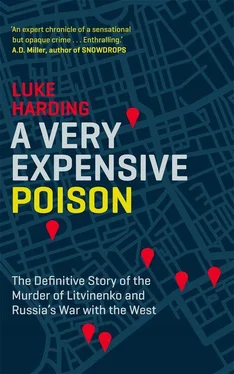That Litvinenko was in poor shape was obvious. His symptoms were abdominal pain, diarrhoea and vomiting. Medical staff diagnosed gastro-enteritis with mild dehydration. They prescribed ciprofloxacin, a broad-spectrum antibiotic. As a precaution, to prevent possible infection spreading, they put him in a side-room. He was admitted as Edwin Redwald Carter, his British pseudonym. The hospital’s assumption was that Mr Carter would start to recover in a few days.
At first, this seemed to happen. ‘He did feel a little bit better when he was hospitalised,’ Marina said. The antibiotics stopped the vomiting; Litvinenko felt less exhausted.
Nevertheless, there were two issues of concern. One was medical: tests showed that Litvinenko’s white blood-cell count was unusually low. In fact his white blood-cell and platelet count was steadily sinking. This didn’t really fit with a diagnosis of gastro-enteritis. It might be a side effect of the fairly powerful antibiotics he was taking, doctors thought.
The other was scarcely believable, from the realm of spy thrillers and John le Carré rather than real life. On 7 November, Mrs Carter – as medical notes reference her – first raised the possibility that her husband may have been poisoned. He had, she said, worked for the Soviet KGB. And knew ‘dangerous people’. Was it possible that someone might have put something in his food or drink?
The story made little sense. Doctors reassured her that this was ‘unlikely’, though they did record on Edwin Carter’s file: ‘Patient and wife concerned about intentional infection of patient, query poison?’
Litvinenko and his wife were increasingly convinced that his ever more painful symptoms were not the result of contaminated food or bad sushi. They suspected foul play. Was this some kind of reckoning? Litvinenko gave an interview to the BBC Russian Service, explaining that he’d narrowly survived a poisoning attempt and was now recovering in a London hospital. He mentioned his lunch with the Italian Mario Scaramella, but kept quiet about his meeting with Lugovoi and Kovtun.
The poisoning claim was sensational indeed. But was it true? Chechenpress , the Chechen website for which Litvinenko worked, picked up the story, as did the independent opposition radio station Echo of Moscow.
Alex Goldfarb got a call from one of its journalists. Goldfarb was in Paris. He perused the internet – where the story was starting to bubble – but was disinclined to take it terribly seriously. He rang his friend Alexander, who confirmed he thought he’d been poisoned. An incredulous Goldfarb told him: ‘But come on, who would poison you? It’s too much. Probably you have some sort of stomach ailment.’
Others were similarly sceptical. From his hospital bed, Litvinenko called his friend and fellow exile Viktor Suvorov and told him: ‘I’m poisoned.’ (Suvorov had previously advised Litvinenko to be careful, and suggested he might do well to move out of London, as he had, to a quieter part of the country.)
Suvorov replied: ‘Sash, come on! It’s rubbish.’
Litvinenko persisted: ‘No, really. I’m poisoned. I’m calling you from hospital.’
It was proving equally difficult to persuade hospital staff to take his theory seriously.
Then on 11 November, a week after he was admitted, something terrible and strange happened.
Litvinenko’s hair began to fall out. At first, in small clumps. Marina was visiting her husband in hospital every day; sometimes Anatoly went too. She saw him on Sunday, 12 November; he complained of pain in his throat. When she returned the next morning Litvinenko looked much worse: a spectral figure, weak, pathetic and ‘completely different’. Marina stroked her husband’s head, a calming gesture. She looked at her hand in horror: his hair was on her glove. It was on his shoulder and pillow too – everywhere. Marina was distraught. And, uncharacteristically, angry. She railed at medical staff: ‘What’s this? Can anyone tell me what’s happened to my husband?’
With Marina was Valentina Michena, a Russian ex-nurse in her late fifties whom Marina had befriended. Michena had arrived in the UK from Russia in 2000. She knew nobody, was lonely, and began chatting to Marina in a shop. ‘Marina is a lovely, lovely person,’ she said. Michena became a surrogate granny to Anatoly. When Litvinenko fell ill she moved into the family’s Muswell Hill home. She offered to cut Litvinenko’s hair, what was left of it. The doctors agreed. They asked Michena to collect the hair in a plastic bag, so they could test it.
Litvinenko was unperturbed by his dramatic hair loss. He was a good-looking man but had never been vain or preening. Michena tugged at the hair from the front; the hair at the back yielded less readily. ‘My appearance does not bother me at the moment,’ he told her. She finished the job with clippers. He was bald.
‘During those five days while I was visiting, his hair was falling down easily,’ Michena said. ‘It was like you would blow a dandelion.’
* * *
By this point Litvinenko was convinced he’d been the victim of a serious poisoning. He even knew who he thought had done it. In his BBC interview, he’d pointed to Scaramella, his Italian contact. In fact, he was certain that it was the two Russians – the known Lugovoi and the unknown Kovtun – who were to blame. Litvinenko was by nature an optimist, and remained confident he would beat his illness. By concealing Lugovoi and Kovtun’s role, he was hoping to draw them back from Moscow to the UK, where the authorities might then arrest them.
Meanwhile, his physicians were becoming concerned. On 13 November, Dr Andres Virchis, a haematologist at Barnet Hospital, reviewed his case. It was, he admitted, a ‘bit of a puzzle’. A diagnosis of gastro-enteritis now seemed less likely. Litvinenko was exhibiting a whole set of different, troubling symptoms; his platelet count had fallen through the floor and then there was the alopecia – abrupt, alarming hair loss. Nothing really fitted together.
‘It just struck me that he looked like one of my patients who had had chemotherapy,’ Virchis said. ‘If you look at cancer treatment, there’s various levels of intensity. There’s outpatient treatment, but there are patients with acute leukaemia, a serious form of blood cancer, given very intensive chemotherapy. He looked just like a patient of mine that had had treatment.’
The senior team managing Litvinenko started to explore other possibilities. The idea that he had been poisoned was beginning to look less fanciful. The next day, 14 November, Virchis began discussions with a toxicologist at Guy’s Hospital in London; they agreed to test for heavy metals and to carry out a biopsy. Litvinenko was extremely unwell. Virchis thought he looked like someone with acute radiation sickness. He wrote in the medical file: ‘Ask radiology re. check radioactive sources of poisoning.’
The doctors were groping slowly towards an answer. On 15 November they brought a Geiger counter over Litvinenko for the first time. It looked like a chunky pocket calculator; if it found beta or gamma emissions the instrument would emit a loud whine. There was nothing. The notes record: ‘Geiger Counter – No Emission.’ The hospital didn’t have equipment to measure much rarer alpha radiation; the only institution capable of doing that was the British nuclear weapons centre at Aldermaston.
As news of Litvinenko’s condition spread, visitors arrived. That evening, Goldfarb dropped by. He was worried by what he discovered. Litvinenko was neutropenic. Goldfarb was a microbiologist by training and perfectly understood what this meant: Litvinenko’s immune system was in ruinous shape, and collapsing.
Litvinenko told him about his suspicion that Lugovoi was the culprit. Goldfarb felt it was imperative the police get involved. The next day Goldfarb returned to Barnet Hospital with George Menzies, Litvinenko’s long-time lawyer. They spent two hours at his bedside. Though weak, Litvinenko was in no doubt who was behind the plot, croaking to Menzies: ‘You see, they have poisoned me’ – ‘they’ being Russia’s secret services.
Читать дальше












